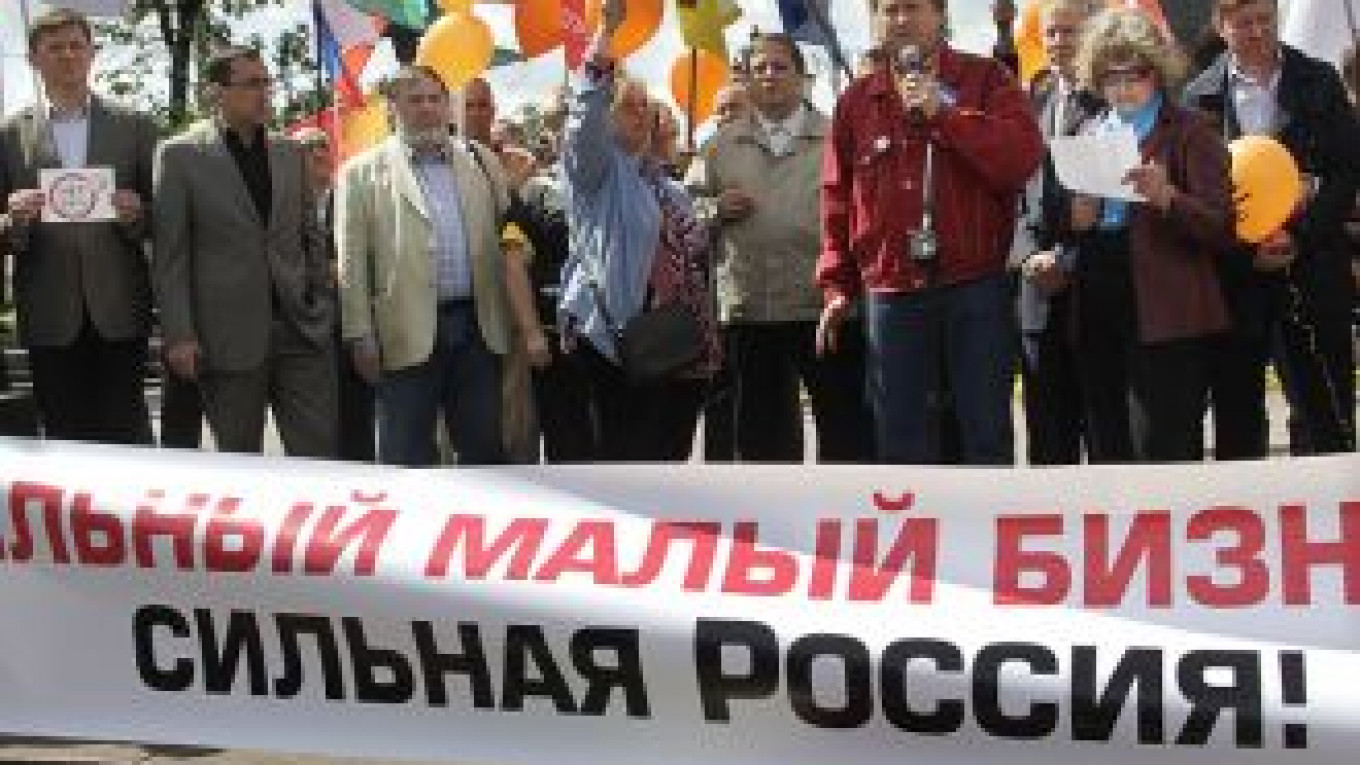Prime Minister Vladimir Putin vowed to ease the social tax burden for companies and promised that the country’s per capita GDP would double from the current $19,700 within a decade.
“We are now actively working on how to cut social security taxes. It is not a simple task. But I believe we must do it,” Putin said Thursday.
He made his statement during an annual conference organized by Delovaya Rossia, a lobby group that unites businesses not working in the natural resources sector.
Putin said the plan to reduce the current 34 percent tax on payroll that companies must pay for mandatory employee insurance, pension and social needs has been mutually agreed upon with the government, the president and his administration. “I am not ready to give the final parameters,” he said, adding, “We all believe that it should be done, but we should not make any mistakes.”
It was Putin’s government that introduced the law last year ordering the tax increase from Jan. 1, 2011, up from the previous 26 percent.
According to business owners and experts, the heavier tax burden forced many small and midsized enterprises to return to the practice of paying part of their employees’ salaries in “envelopes” filled with cash to avoid paying taxes.
Putin added that his government would work with trade unions to find a common solution. Such a gesture to the United Russia-controlled Federation of Independent Trade Unions prompted Yana Yakovleva, head of the group Business Solidarity, to comment that a business-oriented solution was not likely.
“I think they will find some obscure category of small businesses and lower the social tax burden for them,” said Yakovleva, who -attended the Delovaya Rossia forum. “In this country it is not customary to roll back decisions.”
She also said Putin’s statement was made more for the sake of the upcoming elections to please the manufacturing sector.
“I do not exclude the idea that this was an election-year promise made by the prime minister,” political expert and Public Chamber member Iosif Diskin said.
Diskin was referring to the All-Russia People’s Front, a populist movement chaired by Putin whose goal is to drum up support for United Russia. Delovaya Rossia is among several business and public groups that have joined the front.
But Diskin added that Delovaya Rossia had early lobbied to lower the social tax and replace it with increases on tobacco and alcohol excise taxes. “Their point of view has finally gotten through to the authorities,” he said.
Yakovleva said that, despite Putin’s promises, the forum disappointed her. “The prime minister appeared really concerned and said many of the right things, but he spoke a lot in future tense. I also didn’t hear the word ‘corruption’ once,” Yakovleva said.
Putin’s statement concerning the lowering of the social tax was made on the same day that several hundred businesspeople gathered at Moscow’s downtown Pushkin Square to demand a reduction of the social tax. The protesters carried a coffin bearing the name “middle class” on it as a symbol of government neglect toward the country’s fragile midsized businesses, which employ 15 million to 20 million people, according to various estimates.
Similar rallies, supported by opposition parties, including A Just Russia and the Liberal Democratic Party, were conducted simultaneously in Ryazan, Izhevsk, Krasnoyarsk and other cities.
Many small companies have gone out of business after the increase of the social tax, said Grigory Strelkov, deputy head of the Udmurt branch of Opora Russia, an association of small businesses. “Some just withdrew into the shadows and started to pay ‘gray’ salaries,” Strelkov told the Udm-Info news agency Thursday.
Presenting himself as a leader of global ambitions, Putin said during the conference that over the next 10 years Russian GDP would increase to make the country the world’s firth-largest economy per capita.
Putin, in an address in 2003, the year before he ran for re-election as president, promised to double GDP within a decade.
While the economy is currently the eighth-largest globally in terms of consumer spending, Russia ranks one of the last in Europe in terms of GDP per capita.
Putin has said he or President Dmitry Medvedev may run in next year’s presidential election.
The tense situation between the government and small and midsized businesses makes it hard for domestic entrepreneurs to start their own companies. According to a recent survey conducted by GlobeScan market research, 61 percent of Russians have no desire to start their own business.
More then 24,500 Russian citizens took part in the poll conducted last year, the BBC reported, citing Globe Scan.
A Message from The Moscow Times:
Dear readers,
We are facing unprecedented challenges. Russia's Prosecutor General's Office has designated The Moscow Times as an "undesirable" organization, criminalizing our work and putting our staff at risk of prosecution. This follows our earlier unjust labeling as a "foreign agent."
These actions are direct attempts to silence independent journalism in Russia. The authorities claim our work "discredits the decisions of the Russian leadership." We see things differently: we strive to provide accurate, unbiased reporting on Russia.
We, the journalists of The Moscow Times, refuse to be silenced. But to continue our work, we need your help.
Your support, no matter how small, makes a world of difference. If you can, please support us monthly starting from just $2. It's quick to set up, and every contribution makes a significant impact.
By supporting The Moscow Times, you're defending open, independent journalism in the face of repression. Thank you for standing with us.
Remind me later.






